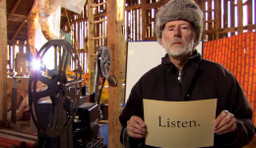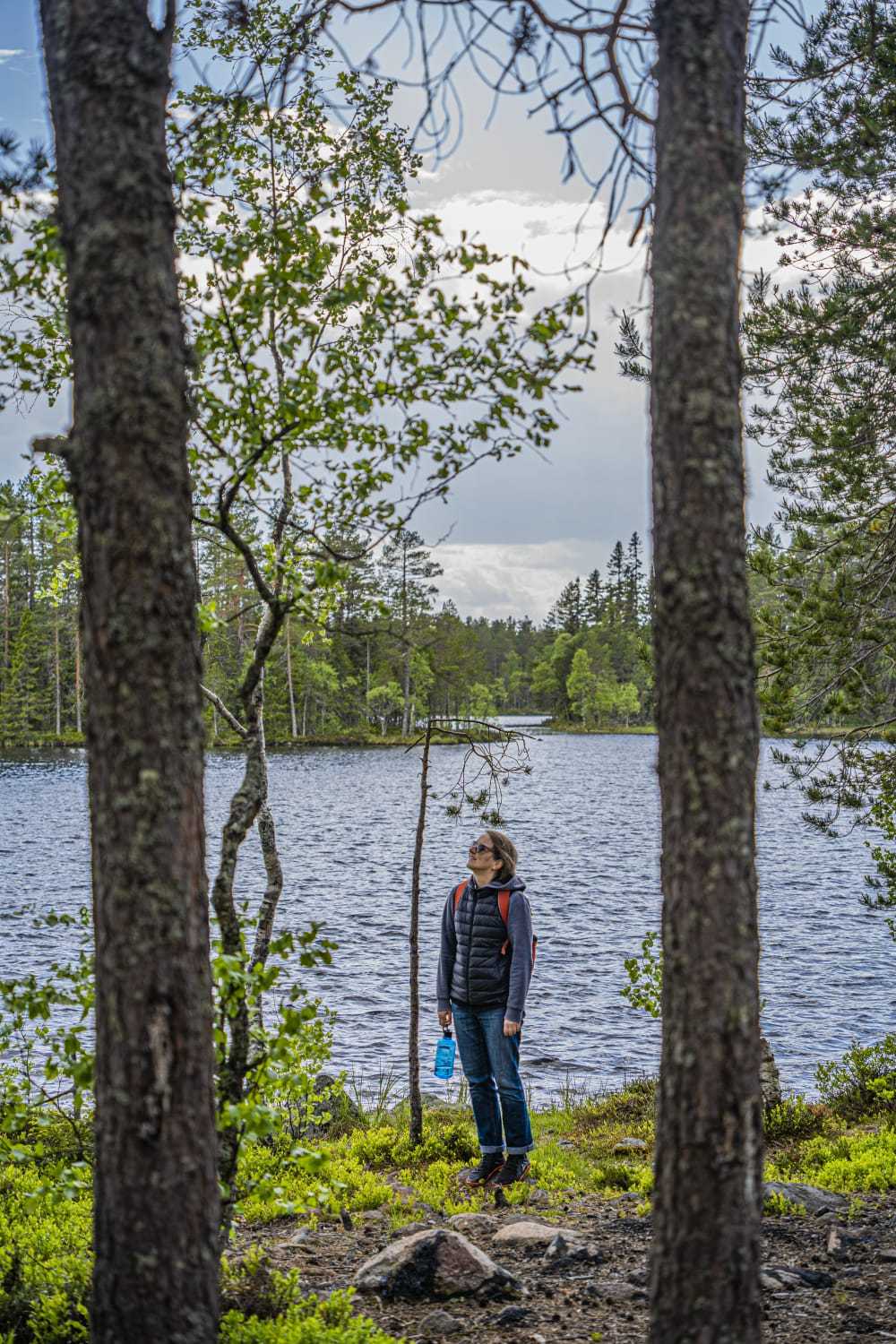
Behold the new orchestra! The environmental legacy of R. Murray Schafer
Raymond Murray Schafer is best known as one of the fathers of acoustic ecology and for setting up the World Soundscape Project in the late 1960s, but his legacy goes beyond soundscapes. As a restless polymath, he composed, wrote, and educated others. The soundscape project, which started as an artistic undertaking – due to soundscapes having “an artistic quality” – turned unintentionally into a unique form of environmentalism, by raising awareness (through recorded sounds of the audio ‘landscape’) of the damage inflicted by humans on the natural world.
Born in 1933, Schafer’s life spanned the century which has seen the most rapid and dramatic effects of human activity on the surface of the planet. He left behind a treasure trove of sounds (both natural and composed) and words, or a combination of the two (see his graphic notations: “the representation of music through the use of visual symbols outside the realm of traditional music notation”) and other surprising combinations of media, and new ways to look at (or listen to) the world around us.
“I have great hope for the future that we’re going to rediscover the acoustic environment in which we live, and that we’re going to celebrate it and we’re gonna save it.”
The story goes that he wanted to become a painter, but instead, in the early 50s, he went to study music at the Royal Conservatory of Music and the University of Toronto. However, he was soon disillusioned by “the confining atmosphere” of the universities, and terminated his formal studies, embarking instead upon an intensive autodidactic regimen with an emphasis on languages, literature, and philosophy.
He spent time in Vienna, then Britain. He studied medieval German, worked as a journalist (a time during which he also wrote books, like British Composers in Interview), prepared a performance of the poet Ezra Pound’s opera Le testament, and taught at universities for more than a decade. And these are just some of the intellectual undertakings of “a man that makes things” – some readers may be aware of his gallery-displayed pen-and-ink graphic compositions, too.
And then, in the late 1960s, at the Simon Fraser University, Schafer set up the World Soundscape Project – an initiative dedicated to the study of the relationships between people and their acoustic environment, which secured Canada a place at the forefront of the study of soundscape ecology. Even after moving to a farm in Ontario, in 1975, he remained affiliated with the project.

He coined the term ‘soundscape’, meaning our sonic environment: the ever-present array of noises with which we all live. He famously said that, “A soundscape is any collection of sounds, almost like a painting is a collection of visual attractions.” In a way, he did pursue that painter’s career, even if more experimentally, and with different ‘tools’.

In The Soundscape: Our Sonic Environment and the Tuning of the World, Schafer explored the acoustic environment, past and present, and attempted to imagine what it might become in the future. Our sonic environment began with the primordial sounds of nature, but, as civilization continues to develop, we are experiencing an ever-increasing complexity to our sonic surroundings: “an indiscriminate and imperialistic spread of more and larger sounds into every corner of man’s life”. This overabundance of ‘acoustic information’ (like “the creaking wheel, the clang of the blacksmith’s hammer, and the distant chugging of steam trains to the ‘sound imperialism’ of airports, city streets, and factories”) is actually diminishing our ability to hear the nuances and subtleties of sound.
“Behold the new orchestra: the sonic universe! And the musicians: anyone and anything that sounds!”
In the early 80s, Schafer lived temporarily between Switzerland and Toronto, until, in 1987, he purchased a red-brick farmhouse atop a hill in the hamlet of Indian River, near Peterborough, Ontario. He lived in the hamlet until his death in 2021.
As the father of soundscape ecology, it seems appropriate that his choice of location reveals a natural trajectory towards ‘good’ sounds. His years in various large cities across the world likely informed the decision to spend the last decades of his life closer to nature.
“If you listen carefully, your life is enhanced.”
For Schafer, composing music had an egocentric dimension too, which is why he liked to keep his musical compositions separate from his acoustic work.
In terms of his musical career, he’s probably (still) the best known Canadian composer. He was also the first recipient of the Jules Léger Prize in 1978 – a Canadian contemporary classical music award given to composers in recognition of quality new works of chamber music.
Becoming a ‘serious’ composer was a challenge for Schafer, and though he successfully achieved it, moving to a farm miles away from any big city radically changed his life, including his perspective on music and his approach to composing. Interviewed in 2011, he shared that, far from working with large orchestras, he had started to improvise with the natural sounds around his farm; nature, with its birdsong, wind, and rustling leaves, became his orchestra. Thus, his music can be performed easily in concert halls and forests alike. Or in the early morning, in the rain.
Many of his chamber music compositions are available online for non-commercial use on the Vancouver Chamber Choir website. Alternatively, you can buy his recordings. On YouTube, certain compositions are displayed with Schafer’s introductions, and their original scores. Here are a few:
‘Snowforms’
“As the urban populations of the world grow, the forces and charms of nature are more distanced from increasing numbers or people. But I do not write such works out of nostalgia; they are a very real part of my life… ‘Snowforms’ began as a series of sketches of snowdrifts, seen out the window of my Monteagle Valley farmhouse. I took these sketches and traced a pentagram over them. The notes of the piece emerged wherever the lines of the sketch and the stave crossed. Of course I modified the drawings as necessary since the work is primarily a piece of music and only secondarily a set of sketches. I printed the work so that the shapes of the snow were white over a pale blue background” – R. Murray Schafer
“A garden is a place where nature is cultivated. It is a humanized treatment of landscape. Trees, fruit, flowers, grass are sculpted organically from the wilderness by art and science… A true garden is a feast for all the senses.” – R. Murray Schafer
‘Magic Songs’
This composition is a trip “back to the era of ‘tone magic’, when the purpose of singing was not merely to give pleasure but was intended to bring about a desired effect in the physical world. In spirit culture, everything has its voice and the aim of the singer is to unify her – or himself with this voice.
“The aim of these songs, with magic texts in a language spoken by no human, is to restore aspects of nature which have been destroyed or neglected by humanity. To the extent that the performers and the audience believe in them, they will be successful.”

In 2011, Schafer shared his hope for expanding the meaning of the word ‘soundscape’, just as we have with ‘landscape’. In that way, soundscape research could be used to spread awareness about ‘bad sounds’ and the pollution of our sonic environment, to educate people about the effect of noise pollution on our ears and other aspects of global and individual health, and the creation of healthier environments.
References:
Listen
https://www.youtube.com/watch?v=rOlxuXHWfHw&t=307s
Soundscapes of R. Murray Schafer (Vancouver Chamber Choir)
https://www.youtube.com/playlist?list=PLsqJWgdhDPkwphmV_vSboWfkrY0cMc3KX
The World Soundscape Project
https://www.thecanadianencyclopedia.ca/en/article/world-soundscape-project-emc
An interview with Murray Schafer (Corfu, 2011)
https://www.youtube.com/watch?v=Hu4au_4Jlfo
The Musical Mind: ‘R. Murray Schafer, Composer’
https://www.youtube.com/watch?v=a6LsvEt952Q
Schafer’s books
https://www.goodreads.com/author/show/319053.R_Murray_Schafer
My Life on Earth and Elsewhere
https://www.goodreads.com/book/show/13814439-my-life-on-earth-elsewhere
Earth.fm is a completely free streaming service of 1000+ nature sounds from around the world, offering natural soundscapes and guided meditations for people who wish to listen to nature, relax, and become more connected. Launched in 2022, Earth.fm is a non-profit and a 1% for the Planet Environmental Partner.
Check out our recordings of nature ambience from sound recordists and artists spanning the globe, our thematic playlists of immersive soundscapes and our Wind Is the Original Radio podcast.
You can join the Earth.fm family by signing up for our newsletter of weekly inspiration for your precious ears, or become a member to enjoy the extra Earth.fm features and goodies and support us on our mission.
Subscription fees contribute to growing our library of authentic nature sounds, research into topics like noise pollution and the connection between nature and mental wellbeing, as well as funding grants that support emerging nature sound recordists from underprivileged communities.

